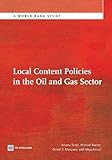Local content policies in the oil and gas sector / Silvana Tordo, Michael Warner, Osmel E. Manzano and Yahya Anouti.
By: Tordo, Silvana
Contributor(s): Anouti, Yahya | Manzano, Osmel | Warner, Michael
Material type: TextPublisher: Washington, D.C. : World Bank, [2013]Description: 1 online resource (xviii, 173 pages) illustrations ; 26 cmContent type: text Media type: unmediated Carrier type: volumeISBN: 0821399314 (pbk.); 9780821399316 (pbk.)Subject(s): Petroleum industry and trade -- Economic aspects | Petroleum industry and trade -- Government policy | Petroleum reserves -- Economic aspectsAdditional physical formats: Print Version:DDC classification: 337 qL811 2013 Online resources: home Summary: A number of countries have recently discovered and are developing oil and gas reserves. Policy makers in such countries are anxious to obtain the greatest benefits for their economies from the extraction of these exhaustible resources by designing appropriate policies to achieve desired goals. One important theme of such policies is the so-called local content created by the sectorthe extent to which the output of the extractive industry sector generates further benefits to the economy beyond the direct contribution of its value-added, through its links to other sectors. While local content policies have the potential to stimulate broad-based economic development, their application in petroleum-rich countries has achieved mixed results. This paper describes the policies and practices meant to foster the development of economic linkages from the petroleum sector, as adopted by a number of petroleum-producing countries both in and outside the Organisation for Economic Co-operation and Development. Examples of policy objectives, implementation tools, and reporting metrics are provided to derive lessons of wider applicability. The paper presents various conclusions for policy makers about the design of local content policies.
TextPublisher: Washington, D.C. : World Bank, [2013]Description: 1 online resource (xviii, 173 pages) illustrations ; 26 cmContent type: text Media type: unmediated Carrier type: volumeISBN: 0821399314 (pbk.); 9780821399316 (pbk.)Subject(s): Petroleum industry and trade -- Economic aspects | Petroleum industry and trade -- Government policy | Petroleum reserves -- Economic aspectsAdditional physical formats: Print Version:DDC classification: 337 qL811 2013 Online resources: home Summary: A number of countries have recently discovered and are developing oil and gas reserves. Policy makers in such countries are anxious to obtain the greatest benefits for their economies from the extraction of these exhaustible resources by designing appropriate policies to achieve desired goals. One important theme of such policies is the so-called local content created by the sectorthe extent to which the output of the extractive industry sector generates further benefits to the economy beyond the direct contribution of its value-added, through its links to other sectors. While local content policies have the potential to stimulate broad-based economic development, their application in petroleum-rich countries has achieved mixed results. This paper describes the policies and practices meant to foster the development of economic linkages from the petroleum sector, as adopted by a number of petroleum-producing countries both in and outside the Organisation for Economic Co-operation and Development. Examples of policy objectives, implementation tools, and reporting metrics are provided to derive lessons of wider applicability. The paper presents various conclusions for policy makers about the design of local content policies.
"A World Bank study."
Includes bibliographical references.
A number of countries have recently discovered and are developing oil and gas reserves. Policy makers in such countries are anxious to obtain the greatest benefits for their economies from the extraction of these exhaustible resources by designing appropriate policies to achieve desired goals. One important theme of such policies is the so-called local content created by the sectorthe extent to which the output of the extractive industry sector generates further benefits to the economy beyond the direct contribution of its value-added, through its links to other sectors. While local content policies have the potential to stimulate broad-based economic development, their application in petroleum-rich countries has achieved mixed results. This paper describes the policies and practices meant to foster the development of economic linkages from the petroleum sector, as adopted by a number of petroleum-producing countries both in and outside the Organisation for Economic Co-operation and Development. Examples of policy objectives, implementation tools, and reporting metrics are provided to derive lessons of wider applicability. The paper presents various conclusions for policy makers about the design of local content policies.
Description based on print version record.


There are no comments on this title.